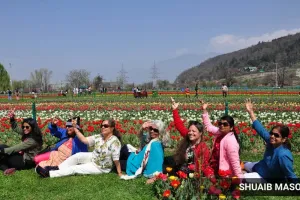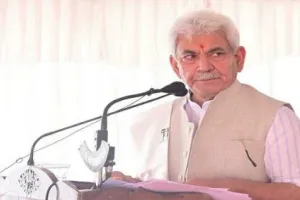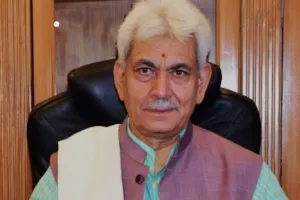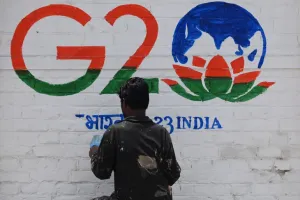Tourism
<% catList.forEach(function(cat){ %> <%= cat.label %> <% }); %>
<%- node_title %>
Published On
By <%= createdBy.user_fullname %>
<%- node_title %>
Published On
By <%= createdBy.user_fullname %>
<% if(node_description!==false) { %> <%= node_description %>
<% } %> <% catList.forEach(function(cat){ %> <%= cat.label %> <% }); %>
Read More... Sonamarg to be a Prime Destination During this Winter: Secretary Tourism
Published On
By HT Online Editor
 SRINAGAR: Secretary Tourism, Syed Abid Rasheed Shah, today convened a virtual meeting of officers and stakeholders to review winter preparedness and allied facilities for keeping Sonamarg open during the winter season. The meeting was attended by Deputy Commissioner Ganderbal, Shyambir,...
SRINAGAR: Secretary Tourism, Syed Abid Rasheed Shah, today convened a virtual meeting of officers and stakeholders to review winter preparedness and allied facilities for keeping Sonamarg open during the winter season. The meeting was attended by Deputy Commissioner Ganderbal, Shyambir,... Number of Foreign Tourists Gone Up By 350 pc In Comparison To Last year: LG
Published On
By HT Online Editor
 SRINAGAR: The number of foreign tourists visiting Jammu and Kashmir has gone up by 350% in comparison to last year. This was stated by J&K Lieutenant Governor Manoj Sinha today while interacting with the members of Young Presidents’ Organization (YPO)...
SRINAGAR: The number of foreign tourists visiting Jammu and Kashmir has gone up by 350% in comparison to last year. This was stated by J&K Lieutenant Governor Manoj Sinha today while interacting with the members of Young Presidents’ Organization (YPO)... Film Tourism Will Be A Major Driver of Growth and Job Creation for J&K: LG Sinha
Published On
By HT Online Editor
 SRINAGAR: Lieutenant Governor Shri Manoj Sinha inaugurated the first day shoot of upcoming TV show 'Pashmina' in Srinagar, today. The Lt Governor extended his best wishes to Alchemy Films, Sony SAB TV, cast and the entire team for the new...
SRINAGAR: Lieutenant Governor Shri Manoj Sinha inaugurated the first day shoot of upcoming TV show 'Pashmina' in Srinagar, today. The Lt Governor extended his best wishes to Alchemy Films, Sony SAB TV, cast and the entire team for the new... Govt Committed To Make J&K Hub of Medical, Wellness Tourism: LG
Published On
By HT Online Editor
 SRINAGAR: Lieutenant Governor Shri Manoj Sinha addressed a Consultative meeting on “Ayushman Bharat Digital Mission - Heal in India, Heal by India,” organized by National Commission for Indian System of Medicine (ISM), Ministry of AYUSH, today at University of Kashmir....
SRINAGAR: Lieutenant Governor Shri Manoj Sinha addressed a Consultative meeting on “Ayushman Bharat Digital Mission - Heal in India, Heal by India,” organized by National Commission for Indian System of Medicine (ISM), Ministry of AYUSH, today at University of Kashmir.... Revived Film Tourism In 2021; Gates Open For Bollywood, Hollywood in J&K: LG Sinha
Published On
By HT Online Editor
 SRINAGAR: Jammu and Kashmir’s Lieutenant Governor Manoj Sinha Tuesday said that the UT reflects multi-cultural ethos of India and the administration led by him has revived film tourism under the film policy 2021 to open the gates of ‘paradise’ for...
SRINAGAR: Jammu and Kashmir’s Lieutenant Governor Manoj Sinha Tuesday said that the UT reflects multi-cultural ethos of India and the administration led by him has revived film tourism under the film policy 2021 to open the gates of ‘paradise’ for... G-20 Tourism Working Group Meet Begins in Srinagar
Published On
By HT Online Editor
 SRINAGAR: The G20 Tourism Working Group Meeting began in Srinagar today and will continue till Wednesday. During the three-day meeting, delegates from G20 member countries, invited countries, and international organisations will hold discussions to work collectively towards advancing the tourism...
SRINAGAR: The G20 Tourism Working Group Meeting began in Srinagar today and will continue till Wednesday. During the three-day meeting, delegates from G20 member countries, invited countries, and international organisations will hold discussions to work collectively towards advancing the tourism... Climate Change And the Impact on the Region
Published On
By HT Online Editor
 The Kashmir region, located in the Himalayan mountains, is a beautiful and ecologically diverse area that has been experiencing the impact of climate change for several years now. Rising temperatures, changes in precipitation patterns, and melting glaciers are having significant consequences for the region's ecosystems and the people who rely on them. One of the most significant impacts of climate change in Kashmir is the melting of the region's glaciers. The Himalayan glaciers are critical sources of freshwater for millions of people in South Asia, and the melting of these glaciers is leading to reduced water availability in the region. In Kashmir, this is particularly problematic given that the region already experiences water scarcity, and the situation is likely to worsen as the glaciers continue to melt. The melting of glaciers in Kashmir is also leading to an increased risk of floods and landslides. As the glaciers retreat, they leave behind loose sediment that can become unstable and prone to landslides. At the same time, the melt water from the glaciers can contribute to flash flooding, which can be devastating for communities downstream. This is a particularly significant concern in Kashmir, where many communities are situated in high-risk areas. In addition to the impacts on water resources and the risk of natural disasters, climate change is also leading to changes in the region's ecosystems. Rising temperatures and changes in precipitation patterns are altering the distribution of plant and animal species in the region, with potentially significant consequences for biodiversity. For example, many species of birds that migrate to the Himalayas are arriving earlier or later than usual due to changes in weather patterns. This can lead to mismatches in the timing of food availability, which can impact the birds' breeding success. The impacts of climate change in Kashmir are not limited to the region's natural systems. The region's economy and the livelihoods of many people who live there are also being affected. Agriculture is a critical sector in Kashmir, and changes in precipitation patterns are already affecting crop yields. As the water supply becomes more uncertain, farmers are finding it increasingly difficult to plan their planting and harvesting schedules. This is leading to economic insecurity for many rural communities in the region. Tourism is another sector that is being impacted by climate change in Kashmir. The region's stunning landscapes and cultural heritage make it a popular destination for tourists, but the impacts of climate change are leading to a decline in tourism. The risk of natural disasters such as landslides and floods is making tourists wary of visiting the region, and the changing ecosystems are altering the region's appeal to visitors. In conclusion, the impact of climate change in the Kashmir region is far-reaching and significant. The melting of glaciers, changes in precipitation patterns and alterations to ecosystems are affecting the region's water resources, natural systems, economy, and livelihoods. Urgent action is needed to address the root causes of climate change.
The Kashmir region, located in the Himalayan mountains, is a beautiful and ecologically diverse area that has been experiencing the impact of climate change for several years now. Rising temperatures, changes in precipitation patterns, and melting glaciers are having significant consequences for the region's ecosystems and the people who rely on them. One of the most significant impacts of climate change in Kashmir is the melting of the region's glaciers. The Himalayan glaciers are critical sources of freshwater for millions of people in South Asia, and the melting of these glaciers is leading to reduced water availability in the region. In Kashmir, this is particularly problematic given that the region already experiences water scarcity, and the situation is likely to worsen as the glaciers continue to melt. The melting of glaciers in Kashmir is also leading to an increased risk of floods and landslides. As the glaciers retreat, they leave behind loose sediment that can become unstable and prone to landslides. At the same time, the melt water from the glaciers can contribute to flash flooding, which can be devastating for communities downstream. This is a particularly significant concern in Kashmir, where many communities are situated in high-risk areas. In addition to the impacts on water resources and the risk of natural disasters, climate change is also leading to changes in the region's ecosystems. Rising temperatures and changes in precipitation patterns are altering the distribution of plant and animal species in the region, with potentially significant consequences for biodiversity. For example, many species of birds that migrate to the Himalayas are arriving earlier or later than usual due to changes in weather patterns. This can lead to mismatches in the timing of food availability, which can impact the birds' breeding success. The impacts of climate change in Kashmir are not limited to the region's natural systems. The region's economy and the livelihoods of many people who live there are also being affected. Agriculture is a critical sector in Kashmir, and changes in precipitation patterns are already affecting crop yields. As the water supply becomes more uncertain, farmers are finding it increasingly difficult to plan their planting and harvesting schedules. This is leading to economic insecurity for many rural communities in the region. Tourism is another sector that is being impacted by climate change in Kashmir. The region's stunning landscapes and cultural heritage make it a popular destination for tourists, but the impacts of climate change are leading to a decline in tourism. The risk of natural disasters such as landslides and floods is making tourists wary of visiting the region, and the changing ecosystems are altering the region's appeal to visitors. In conclusion, the impact of climate change in the Kashmir region is far-reaching and significant. The melting of glaciers, changes in precipitation patterns and alterations to ecosystems are affecting the region's water resources, natural systems, economy, and livelihoods. Urgent action is needed to address the root causes of climate change. 






